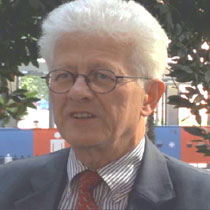-
(单词翻译:双击或拖选)
Washington
01 June 2007
On June 5th, 1947, U.S. Secretary of State George C. Marshall told the graduating class at Harvard University that Europe and the world were in a perilous1 state. World War II had devastated2 the continent and he said the U.S. must do everything it could to return Europe to economic health. Marshall's Harvard speech was the foundation of the so-called Marhsall Plan, a four year, $13 billion foreign aid program. George Lewinski reports.
| Western Europe needed help after the end of World War II |
Dr. Larry Bland6, a historian at the George C. Marshall Foundation, spoke7 about the Marshall Plan. "The prime motivation for launching the Marshall Plan was fear of chaos in Western Europe. You saw this if you went to the movies every weekend. On the beginning of the feature they would show problems in Europe on the newsreels. Starving women and children affect American hearts. So that there's the aspect of women and children in Western Europe. But also the strength of the communist party in countries like France and Italy was very worrisome.
Communist parties were powerful in France and Italy. Eastern Europe was occupied by the Soviet8 Army. There was massive unemployment. Europe's industry was at a standstill.
Immediately after providing emergency supplies of food and clothing, the U.S. Marshall plan focused on economic chokepoints. Coal mines were the first to benefit.
Without coal to fuel factories and mills, Europe's economy would never recover.
Mr. Bland says, "The problem is much of the coal in Western Europe comes from German mines which are flooded and the surface effectively bombed. The Germans have no means of opening these mines and the U.S. is going to provide certain key equipment. The Germans are going to mine all the coal, but we're going to pump out the mines and rebuild workers' housing and vaccinate9 them against TB and other things that will allow them to work very hard."
And the U.S. insisted the Europeans co-operate to move that German coal to the other nations on the continent to heat homes and get the factories moving again.
The United States authorized10 $13 billion over four years -- the equivalent of a $100 billion today spread over 16 countries.
But perhaps the most important part of the Marhsall Plan was its effect on the morale11 of Western Europeans. Even former enemies -- Italians and Germans -- were included.
 |
| Karsten Voight |
Winston Churchill called the Marshall Plan the 'most unsordid act' in history. The recovery from the most destructive war in history was dramatic.
Western Europe's gross national product went up 32 percent in the 4 years of the Marshall Plan's existence, sparked a generation-long economic boom and provided the framework for what eventually became the European union.
 收听单词发音
收听单词发音
1
perilous

|
|
| adj.危险的,冒险的 | |
参考例句: |
|
|
|
2
devastated

|
|
| v.彻底破坏( devastate的过去式和过去分词);摧毁;毁灭;在感情上(精神上、财务上等)压垮adj.毁坏的;极为震惊的 | |
参考例句: |
|
|
|
3
liberated

|
|
| a.无拘束的,放纵的 | |
参考例句: |
|
|
|
4
Nazis

|
|
| n.(德国的)纳粹党员( Nazi的名词复数 );纳粹主义 | |
参考例句: |
|
|
|
5
chaos

|
|
| n.混乱,无秩序 | |
参考例句: |
|
|
|
6
bland

|
|
| adj.淡而无味的,温和的,无刺激性的 | |
参考例句: |
|
|
|
7
spoke

|
|
| n.(车轮的)辐条;轮辐;破坏某人的计划;阻挠某人的行动 v.讲,谈(speak的过去式);说;演说;从某种观点来说 | |
参考例句: |
|
|
|
8
Soviet

|
|
| adj.苏联的,苏维埃的;n.苏维埃 | |
参考例句: |
|
|
|
9
vaccinate

|
|
| vt.给…接种疫苗;种牛痘 | |
参考例句: |
|
|
|
10
authorized

|
|
| a.委任的,许可的 | |
参考例句: |
|
|
|
11
morale

|
|
| n.道德准则,士气,斗志 | |
参考例句: |
|
|
|
12
diplomat

|
|
| n.外交官,外交家;能交际的人,圆滑的人 | |
参考例句: |
|
|
|
13
generosity

|
|
| n.大度,慷慨,慷慨的行为 | |
参考例句: |
|
|
|















